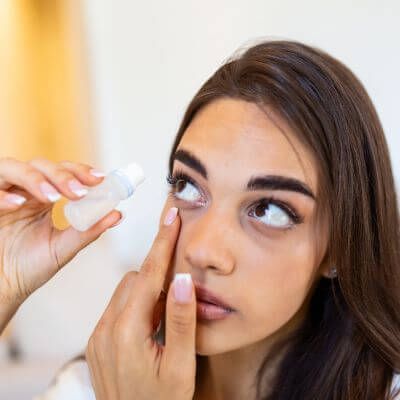4 Helpful Resources If Dry Eyes Are Affecting Your Everyday Life
 A recent article in Ophthalmology Times
highlights the prevalence of dry eye syndrome, and that it has a substantial negative impact on those affected. In fact, approximately 16 million Americans have been diagnosed with dry eye syndrome, while there are still many others who suffer from troublesome dry eye symptoms that have not yet been diagnosed by an eye doctor.
A recent article in Ophthalmology Times
highlights the prevalence of dry eye syndrome, and that it has a substantial negative impact on those affected. In fact, approximately 16 million Americans have been diagnosed with dry eye syndrome, while there are still many others who suffer from troublesome dry eye symptoms that have not yet been diagnosed by an eye doctor.
Dry eye symptoms often include any or all of the following:
- A burning (or “dried out”) sensation in the eyes
- Eye grittiness or stinging
- Watery eyes
- Red or irritated eyes
- Pain when wearing contacts
- Sensitivity to light
- Blurred or fluctuating vision
The symptoms and severity of dry eye syndrome tend to be chronic and progressive if they aren’t addressed. As a result, it’s important to understand how to determine if you have dry eye syndrome and how you can best deal with it so that your everyday activities aren’t negatively impacted
At Baptist Eye Surgeons , we often address dry eye syndrome with our patients who are wondering how they can alleviate uncomfortable symptoms. Here are our top resources for understanding and addressing dry eye syndrome:
How Is Dry Eye Syndrome Diagnosed?
The term “dry eye syndrome” is becoming more mainstream as it continues to be recognized as a common condition, especially as we age. When the quantity or quality of our tears aren’t able to adequately lubricate our eyes, we can experience the uncomfortable symptoms of dry eyes on a chronic basis.
Many people assume they can find relief with over-the-counter eye drops. However, doing so can actually be causing more problems than you’re attempting to solve. Using non-prescribed eye drops for a long period of time isn’t recommended, but even more important is that you need to to understand the precise cause of your dry eyes in order to find the safest and most effective treatment for a long-term solution.
Dry Eye Self-Diagnoses Can Backfire
It’s very common for people with dry eye symptoms to assume that the remedy is simple—just use over-the-counter eye drops, many of which claim to alleviate dry eye symptoms. However, there are different causes of dry eye symptoms, which eye doctors determine by evaluating the chemistry and production of your tears, so there’s no “one quick fix.”
Each type of eye drop is manufactured to work in a different manner, and not all may treat your specific symptoms. In fact, some eye drops may backfire and cause more dry eye symptoms. Getting to the root of exactly why you’re experiencing chronic dry eye symptoms is important to finding safe and permanent relief.
On top of that, your dry eye symptoms might not actually be caused by dry eyes. Symptoms like stinging, burning, light sensitivity, and blurry vision are found in a number of other eye disorders , not just chronic dry eyes. It’s crucial to understand the actual conditions you’re dealing with to not only find relief from dry eye symptoms but also to prevent damage to your vision.
Dealing With Dry Eyes & Digital Strain
Many workplaces have become more aware of how office ergonomics affect the way our backs and necks feel after sitting at desks all day long. But did you know that your desk job also can greatly impact the health and comfort of your eyes, particularly if you’re looking at a computer screen all day?
Staring at screens for long periods of time can easily leave your eyes feeling dry, gritty, or strained. In turn, eye strain can then cause fatigue and headaches, which no doubt interferes with productivity. However, there are a few proven yet basic tips that will give your eyes some much-needed relief from all that screen time.
Dry Eyes, Allergies, Or Both?
There are several symptoms of dry eye and allergies that are similar. However, these two eye conditions require different methods of treatment. For example, antihistamines in eye drops that are formulated for relief of symptoms from allergies can actually make dry eyes feel worse. Drops are designed to treat different symptoms, and the preservatives that are in some artificial tear drops can irritate some people’s eyes. In addition, you can suffer from both eye allergies and dry eye syndrome at the same time, so it’s important to know what’s causing your symptoms in order to effectively treat them.
Baptist Eye Surgeons is an ophthalmological practice in Knoxville, TN, and Morristown, TN, that specializes in common conditions such as dry eye syndrome, as well as treatment of eye diseases like glaucoma, macular degeneration, and cataracts. To meet our doctors and learn more about our specialities, visit our website or give us a call at 865-579-3920 for more information, or conveniently schedule an appointment online.


MORRISTOWN
SEVIERVILLE
TENNESSEE VALLEY - LASER CENTER
TENNESSEE VALLEY - EYE CENTER



